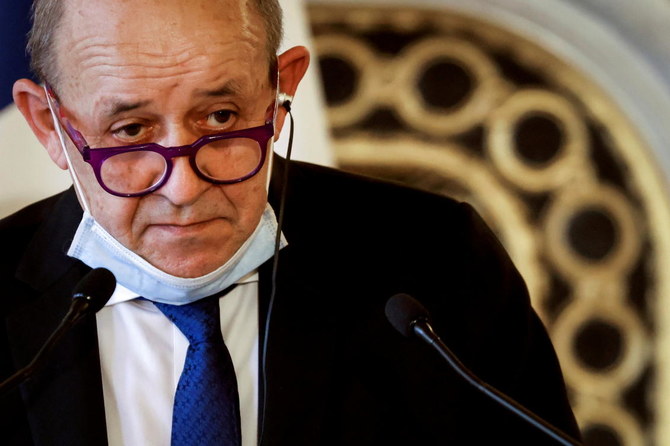PARIS/BEIRUT: French Foreign Minister Jean-Yves Le Drian will visit Lebanon next week to discuss the political crisis there with senior officials, two sources aware of the matter said on Friday.
The trip comes after Paris said it had started putting in place measures to restrict entry to France for some Lebanese officials on the grounds that they were blocking efforts to find a solution to Lebanon’s political and economic crisis.
The two sources said Le Drian would travel on May 5 and hold meetings on May 6.
He has requested meetings with President Michel Aoun and Shiite Hezbollah ally and Speaker of the Parliament Nabih Berri, according to a note sent by the embassy.
Le Drian has also asked to meet Gebran Bassil, the leader of Lebanon’s biggest Christian political bloc and Aoun’s son-in-law, who is under US sanctions for alleged corruption and his ties to Hezbollah.
France has spearheaded international efforts to rescue Lebanon from its deepest crisis since the 1975-1990 civil war, but after eight months has failed so far to persuade squabbling politicians to adopt a reform roadmap or form a new government to unlock international aid.
France’s foreign ministry did not confirm or deny Le Drian’s planned trip.
With the European Union, Paris has been working on creating a sanctions regime for Lebanon that could ultimately see asset freezes and travel bans.
However, that is likely to take time. As part of efforts to raise pressure on key Lebanese actors, France intends to stop issuing visas to certain officials, diplomats have said.
Diplomatic sources have said that Bassil could be one of those targeted, although he has no specific ties to France.
France’s Le Drian to head to Lebanon May 5-6 for crisis talks
https://arab.news/wnztu
France’s Le Drian to head to Lebanon May 5-6 for crisis talks

- French Foreign Minister would travel on May 5 and hold meetings on May 6, two sources said
- France has spearheaded international efforts to rescue Lebanon from its deepest crisis
Syrian government foils Daesh plot to attack churches and New Year celebrations

- Bomber kills soldier in Aleppo, detonates explosives injuring 2 others
ALEPPO, DAMASCUS: The Syrian Interior Ministry announced on Thursday that it had thwarted a Daesh plot to carry out suicide attacks targeting New Year celebrations and churches, particularly in Aleppo.
The ministry said in a statement that, as part of ongoing counterterrorism efforts and careful monitoring of Daesh cells in cooperation with partner agencies, it had received intelligence indicating plans for suicide attacks targeting New Year celebrations in several provinces, particularly Aleppo, with a focus on churches and civilian gathering areas.
The ministry added that it took preemptive measures, including reinforcing security around churches, deploying mobile and fixed patrols, and setting up checkpoints across the city.
During operations at a checkpoint in Aleppo’s Bab Al-Faraj district, security forces intercepted a suspected Daesh member who opened fire. One internal security soldier was killed, and the attacker detonated explosives, injuring two others.
Daesh recently increased its attacks in Syria, and was blamed for an attack last month in Palmyra that killed three Americans.
On Dec. 13, two US soldiers and an American civilian were killed in an attack Washington blamed on a lone Daesh gunman in Palmyra.
In retaliation, American forces struck scores of Daesh targets in Syria.
Syrian authorities have also carried out several operations against Daesh since then, saying on Dec. 25 they had killed a senior leader of the group.












